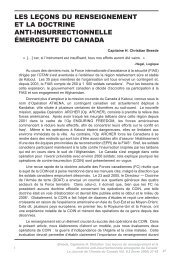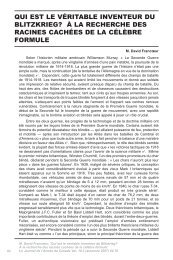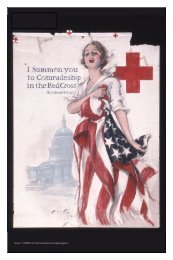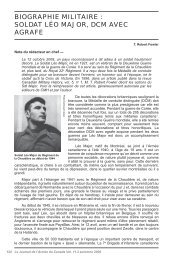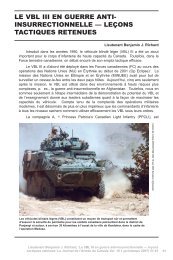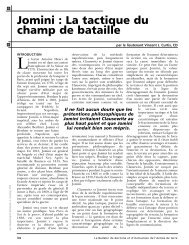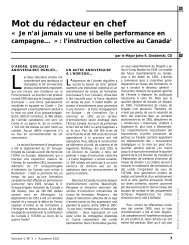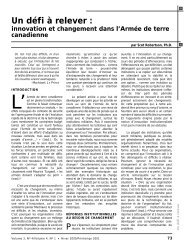The Canadian Army Journal
The Canadian Army Journal
The Canadian Army Journal
You also want an ePaper? Increase the reach of your titles
YUMPU automatically turns print PDFs into web optimized ePapers that Google loves.
84<br />
<strong>The</strong> Post Cold War Environment<br />
This new breed of MPF now dominates the current international security landscape<br />
and will have profound implications for how states conduct armed conflict in the 21st century. This next section will describe some of the reasons these firms have burgeoned<br />
in the post-Cold War environment. This focuses on the end of competition between the<br />
two superpowers, the collapse of state interest in intervening in areas where security<br />
interest has waned, the growth of non-state actors, and the dominance of a pro-private<br />
industry mindset in western nations. Additionally, the broad changes to the nature of<br />
warfare, the expansion of global conflict, and the rise of the failed or failing state will be<br />
examined.<br />
Most academics who have studied the rise of private security firms have developed<br />
a relatively consistent view as to the factors that have contributed to their establishment<br />
and growth. In his article “Roland Goes Corporate” Queen’s University Political Studies<br />
Departmental Head Kim Richard Nossal describes five interrelated developments. <strong>The</strong><br />
first of these factors is the demise of the superpower contest between the United States<br />
(US) and the Soviet Union. This lack of competition reduced the level of importance of<br />
national security institutions while nations sought a “peace dividend” at the end of the<br />
Cold War. Consequently, national militaries experienced a significant downsizing. 18<br />
Secondly, the demise of the superpower rivalry led to the end of proxy wars and a<br />
lack of interest by both the US and the Soviet Union in regions where they had previously<br />
poured considerable resources and energy. Without a significant security competitor,<br />
the interests of the US were often now mostly commercial, with security taking a back<br />
seat. 19 This allowed regions such as Africa considerable leeway in pursuit of solutions<br />
to their own problems.<br />
<strong>The</strong> third reason for the rise of private security firms can be traced to the collapse<br />
of states and the unwillingness of the superpowers to intervene. <strong>The</strong> great powers,<br />
which until 1989 would intervene with military, economic and informational might to<br />
ensure that no client regime lost its state monopoly on the use of violence, now no longer<br />
supplied these resources. However, this new era of failed and failing states has no less<br />
need for intervention and has led to private enterprises presenting a solution for hire. 20<br />
Nossal’s fourth reason is tied to the expansion of opportunities for transnational<br />
actors at the end of the Cold War. It is described as the symbiotic relationship between<br />
sovereign states and transnational actors, who need each other and work together when<br />
the ends coincide. This relationship has led to expansion of non-state actors, both<br />
private and public on the international stage. <strong>The</strong> growth of private military firms can be<br />
traced to this symbiotic relationship. An example of this is the activities of the firm<br />
Executive Outcomes (EO) in Africa in the 1990s. 21<br />
Finally, Nossal describes a neo-conservative ideological climate within the western<br />
world that advocated the efficiency and effectiveness of the private sector over the public<br />
sector. This outlook applied mainly to public services such as electricity grids,<br />
waterworks and highways, but also increasingly applied to the private provision of<br />
security services vice its provision by the state. 22<br />
Other observers and scholars studying the post-Cold War growth of the private<br />
security firm provide similar reasons for the phenomenon. Peter Singer states that the<br />
rise of the private security industry “is not just a flashback to historic private military<br />
agents.” 23 Singer is in general alignment with Nossal when describing the end of the<br />
Cold War as the seminal event in the rise of the private military industry. However,<br />
Singer also describes other factors that led to the emergence of the industry. <strong>The</strong> first<br />
is the broad changes in the nature of warfare. Singer goes on to describe a massive<br />
<strong>Canadian</strong> <strong>Army</strong> <strong>Journal</strong> Vol. 11.1 Spring 2008


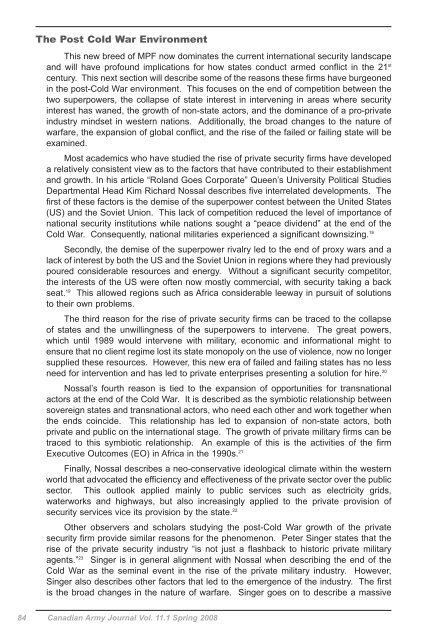
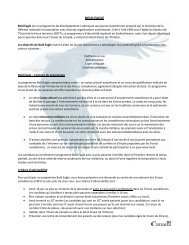

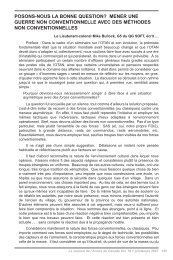

![La modularite dans l'Armee de terre canadienne [pdf 1.6 MB]](https://img.yumpu.com/17197737/1/188x260/la-modularite-dans-larmee-de-terre-canadienne-pdf-16-mb.jpg?quality=85)
